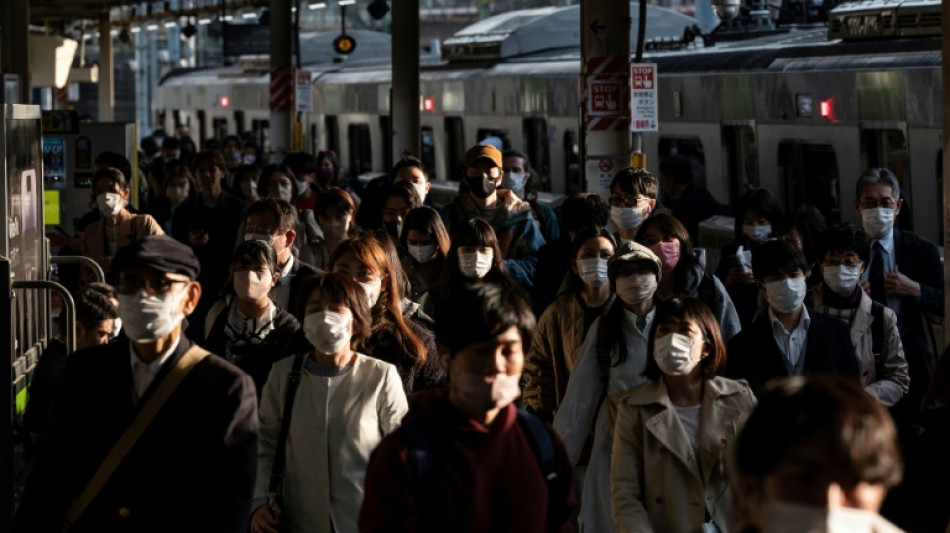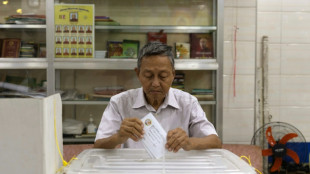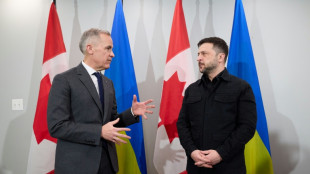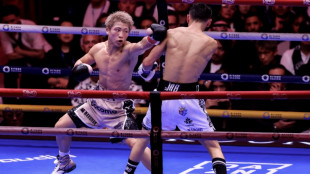
-
 Zelensky looks to close out Ukraine peace deal at Trump meet
Zelensky looks to close out Ukraine peace deal at Trump meet
-
MCG curator in 'state of shock' after Ashes Test carnage

-
 Texans edge Chargers to reach NFL playoffs
Texans edge Chargers to reach NFL playoffs
-
Osimhen and Mane score as Nigeria win to qualify, Senegal draw

-
 Osimhen stars as Nigeria survive Tunisia rally to reach second round
Osimhen stars as Nigeria survive Tunisia rally to reach second round
-
How Myanmar's junta-run vote works, and why it might not

-
 Watkins wants to sicken Arsenal-supporting family
Watkins wants to sicken Arsenal-supporting family
-
Arsenal hold off surging Man City, Villa as Wirtz ends drought

-
 Late penalty miss denies Uganda AFCON win against Tanzania
Late penalty miss denies Uganda AFCON win against Tanzania
-
Watkins stretches Villa's winning streak at Chelsea

-
 Zelensky stops in Canada en route to US as Russia pummels Ukraine
Zelensky stops in Canada en route to US as Russia pummels Ukraine
-
Arteta salutes injury-hit Arsenal's survival spirit

-
 Wirtz scores first Liverpool goal as Anfield remembers Jota
Wirtz scores first Liverpool goal as Anfield remembers Jota
-
Mane rescues AFCON draw for Senegal against DR Congo

-
 Arsenal hold off surging Man City, Wirtz breaks Liverpool duck
Arsenal hold off surging Man City, Wirtz breaks Liverpool duck
-
Arsenal ignore injury woes to retain top spot with win over Brighton

-
 Sealed with a kiss: Guardiola revels in Cherki starring role
Sealed with a kiss: Guardiola revels in Cherki starring role
-
UK launches paid military gap-year scheme amid recruitment struggles

-
 Jota's children join tributes as Liverpool, Wolves pay respects
Jota's children join tributes as Liverpool, Wolves pay respects
-
'Tired' Inoue beats Picasso by unanimous decision to end gruelling year

-
 Thailand and Cambodia declare truce after weeks of clashes
Thailand and Cambodia declare truce after weeks of clashes
-
Netanyahu to meet Trump in US on Monday

-
 US strikes targeted IS militants, Lakurawa jihadists, Nigeria says
US strikes targeted IS militants, Lakurawa jihadists, Nigeria says
-
Cherki stars in Man City win at Forest

-
 Schwarz records maiden super-G success, Odermatt fourth
Schwarz records maiden super-G success, Odermatt fourth
-
Russia pummels Kyiv ahead of Zelensky's US visit

-
 Smith laments lack of runs after first Ashes home Test loss for 15 years
Smith laments lack of runs after first Ashes home Test loss for 15 years
-
Russian barrage on Kyiv kills one, leaves hundreds of thousands without power

-
 Stokes, Smith agree two-day Tests not a good look after MCG carnage
Stokes, Smith agree two-day Tests not a good look after MCG carnage
-
Stokes hails under-fire England's courage in 'really special' Test win

-
 What they said as England win 4th Ashes Test - reaction
What they said as England win 4th Ashes Test - reaction
-
Hong Kongers bid farewell to 'king of umbrellas'

-
 England snap 15-year losing streak to win chaotic 4th Ashes Test
England snap 15-year losing streak to win chaotic 4th Ashes Test
-
Thailand and Cambodia agree to 'immediate' ceasefire

-
 Closing 10-0 run lifts Bulls over 76ers while Pistons fall
Closing 10-0 run lifts Bulls over 76ers while Pistons fall
-
England 77-2 at tea, need 98 more to win chaotic 4th Ashes Test

-
 Somalia, African nations denounce Israeli recognition of Somaliland
Somalia, African nations denounce Israeli recognition of Somaliland
-
England need 175 to win chaotic 4th Ashes Test

-
 Cricket Australia boss says short Tests 'bad for business' after MCG carnage
Cricket Australia boss says short Tests 'bad for business' after MCG carnage
-
Russia lashes out at Zelensky ahead of new Trump talks on Ukraine plan

-
 Six Australia wickets fall as England fight back in 4th Ashes Test
Six Australia wickets fall as England fight back in 4th Ashes Test
-
New to The Street Show #710 Airs Tonight at 6:30 PM EST on Bloomberg Television

-
 Dental Implant Financing and Insurance Options in Georgetown, TX
Dental Implant Financing and Insurance Options in Georgetown, TX
-
Man Utd made to 'suffer' for Newcastle win, says Amorim

-
 Morocco made to wait for Cup of Nations knockout place after Egypt advance
Morocco made to wait for Cup of Nations knockout place after Egypt advance
-
Key NFL week has playoff spots, byes and seeds at stake

-
 Morocco forced to wait for AFCON knockout place after Mali draw
Morocco forced to wait for AFCON knockout place after Mali draw
-
Dorgu delivers winner for depleted Man Utd against Newcastle

-
 US stocks edge lower from records as precious metals surge
US stocks edge lower from records as precious metals surge
-
Somalia denounces Israeli recognition of Somaliland


Japan eases mask guidelines, but few are keen to change
Japan's government eased its mask guidelines on Monday, recommending them only on crowded trains and in hospitals or care homes, but there was little sign residents were keen to unmask.
Japan has never had a mask mandate, but residents have adhered to guidelines to wear them indoors and outside from the early days of the pandemic, and masks were common even pre-Covid during cold and hayfever seasons.
The country is one of the last places in Asia to end nationwide masking recommendations, and on Monday morning most commuters kept their faces covered, on trains and outdoors.
"I think I'll keep wearing a mask for the moment," 46-year-old Tatsuhiko Ohashi told AFP on his way to work, outside Tokyo's busy Shinagawa station.
He still had "a bit of fear" of Covid and worried that getting infected unknowingly would "risk inconveniencing people around me".
Japan avoided lockdowns and other harsh restrictions during the pandemic but still fared better than many countries, with 73,199 deaths in a population of more than 125 million.
Some observers have credited masks and other voluntary measures, along with strict border closures, with that relative success.
But the government has been keen to gradually return to normal, reopening the borders and seeking to stimulate the economy.
There were just over 7,000 Covid cases reported nationwide on Sunday, and businesses have largely said they will leave it up to customers to decide whether to mask -- though staff will continue to wear them.
- 'Bit by bit' -
Hajime Yamaguchi, a professor of psychology at J.F. Oberlin University in Tokyo, said it was unlikely many Japanese would unmask quickly.
"The Japanese worry a lot about what other people think and fear being judged if they're the first to take off their masks," he told AFP.
"They will watch to see what other people do and unmask bit by bit," he added, noting that this year's particularly bad pollen season made it likely masks would be around until at least May.
Half of the people surveyed in February by national broadcaster NHK said they would continue to wear a mask even after the recommendations eased, while 38 percent said they expected to remove them more often.
"A lot of people have started to feel more comfortable behind a mask, realising how reassuring it is to communicate without revealing your face," said Yamaguchi.
Still, there were a handful of commuters embracing the new rules, including 49-year-old Hiromi Mitsui.
"If it's not an obligation, then there's no problem in taking off the mask, it's freedom of the individual," he said.
"Those who want to wear it can do so, and others don't have to. If we respect one another, there's no problem."
Prime Minister Fumio Kishida also arrived at work on Monday morning without a mask for the first time.
His government plans to downgrade the classification of Covid to the same level as the flu from early May.
M.Fischer--AMWN



